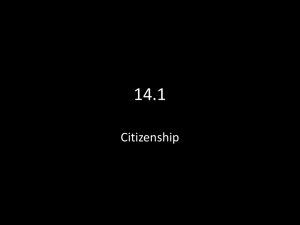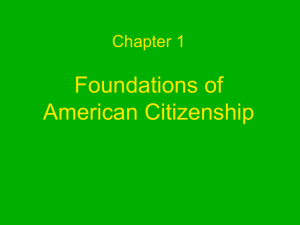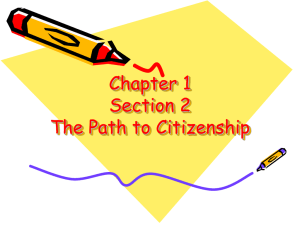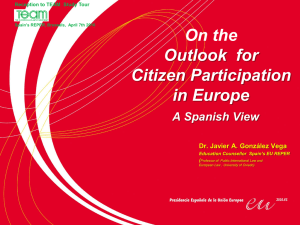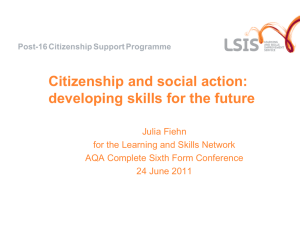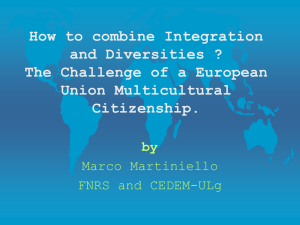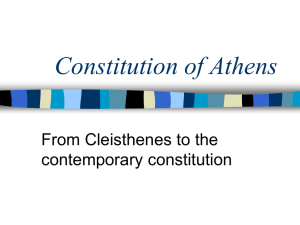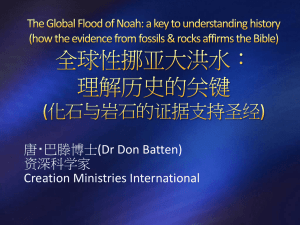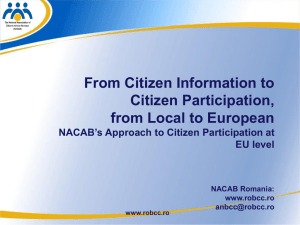Institutional Deficit
advertisement
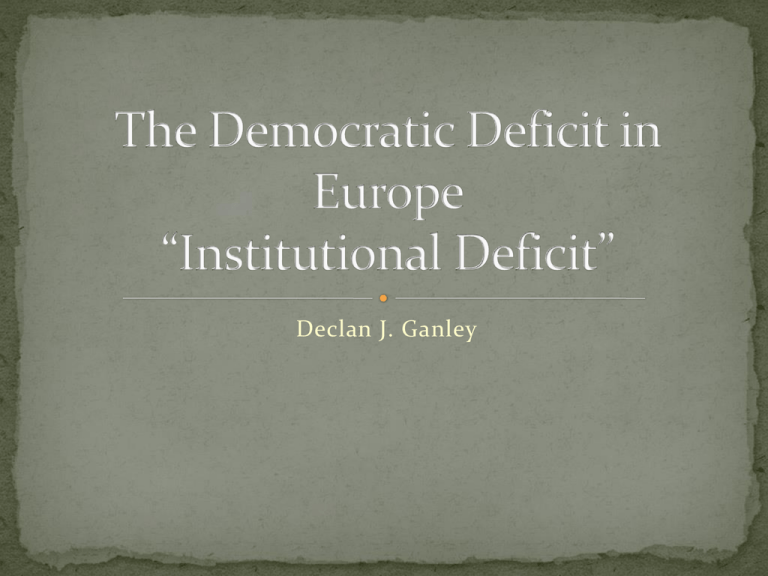
Declan J. Ganley Brussels Current approach = No will in favour of democracy. Institutions reflect this. Member States required to be democracies with governments elected by universal suffrage & governments formed on majority rule. No such system applies to the Union itself. This is the heart of the democratic and institutional deficit. Institutions designed for ‘top down’ exercise of power. This deficit poses a fundamental threat to the success of Europe. Executive, with sole right of legal initiative, deciding many laws entirely on it’s own through ‘delegated legislation’ by the unelected. Abused by lobbyists, influencing lawmakers that never face an electorate and are unknown . Institutionalised corruption not a reflection of individual Commissioners. Commissioners swear oath to the Union (not their country) and have no democratic accountability. E.U. Parliament cannot remove a Commissioner, they can only reject full Commission. They cannot elect a new Commission. Reminiscent of Communist era ‘people’s democracies’. Exclusive right to initiate law. ‘Monopoly of Initiative’. No genuine opposition. No vote for those who propose laws. Not even member state PMs can initiate new law. No clause-by-clause debate on new law. No parallel for this absence of democracy with so much power given to the non-elected. Legislative power fundamentally linked to non-elected bureaucrats = Institutionalised dysfunction. Most Commission decisions made by members of it’s ‘cabinets’ Director Generals. Now actively anti-democratic as evidenced in 4 referenda. Idea behind independence of Commission was to allow EU bureaucracy complete control over portfolios. The fix? Either directly elect Commissioners or have Parliaments elect Commissioners. Commission President elected by Parliament or merge Council and Commission President - one term only. Or remove monopoly of initiative, make pure executive individually appointed/fired by elected President. Decides laws on basis of proposal from the European Commission. Problem. Neither body equipped for drafting laws Results in law-making being a work of unknown remote bureaucrats with no mandate. Most Europeans think EU laws are made by EU Parliament. This is a fundamental misunderstanding. COREPER groups of unknown ‘Ministers’ meet on average every day from Monday to Thursday and decide majority of EU laws – very few discussed in Council itself. Union decides about 3,000 new laws a year, with only 50 or so coming to formal vote in Council meeting. Each ‘Minister’s’ vote weighted to country size. Can only block by qualified majority, e.g. Germany 20 times more than Ireland. Lisbon changes mean political elites gain power without corresponding democratic accountability. ‘Blame Brussels’ – “Brussels made us do it”. Weakest of the Institutions and ‘most’ democratic (no accident). Not a real Parliament. Does not initiate laws or appoint and control the government of E.U. Can propose amendments to laws but practically, only if supported by both left and right. Bloodless, anti-competitive, pseudo–politics. EU legislative power divided between Commission and Council as EU law-making is secret: secret meetings in this secret government of the non-elected operating through non-accountable Ambassador Ministers and their helpers. EU Council and EU Commission operating via thousands of secret working groups = unacceptable. E.U. Parliament = dysfunctional, convenient charade. E.U. Parliament has no say in anything really important in execution of power. Fix? Every E.U. law to be approved by normal majority. Every E.U. law/regulation in existence to be reviewed and re-voted on within five years or scrapped. Two-for-one rule and half-life rule: Every new law proposed by Commission, must have two attached for deletion. Every new law automatically expires after 8 or 15 years unless renewed by Parliament – review results, out live the lobbyist & then see if law/regulation is really needed. Post Lisbon, now our supreme court with clear supremacy over member state laws and most importantly EU Citizens. Highly activist court, a champion of ‘social change through the law’. Judges aren’t required to have judicial experience to be appointed. Deliberations are in secret. Votes of individual judges are unknown. Court goes well beyond interpreting law, it makes and shapes it. Needs urgent reform. One institution that we thought was fit for purpose and functional. Because we thought we were getting the Bundesbank. Now we know we got no such thing. Instead we have a politically over reaching Commission and the IMF. ECB independence needs to be asserted IMMEDIATELY. Credibility of Euro and more at stake. Monetary union short/medium term survival now dependent on political/fiscal union and ‘federalisation’ or Euro suffers large devaluation and inflation returns. Commission hollowing out ECB. Market risk being misallocated to taxpayers. Problem is not credit, its insolvency and its not being addressed. No proper market consequences for profligacy. Distortion of competition, banking system not going through risk/reward purge. Market confused on how to price risk and citizen being forced into role of counter party risk taker-for already failed risk. Need is to de-leverage. More regulation won’t get the money back. Liberalising bankruptcy laws across Union an urgent requirement to allow managed recovery and bad debt write offs. Place risk where it belongs (those who purchased it). Quick fix: Political and fiscal union. Problem with quick fix: Other institutions of Union and the fact that such union wont fix core problems of demographics, profligacy , existing liabilities and insolvency. More than a passport, more than a right to draw benefits. Citizenship, institutes an individuals ‘ark’ of inalienable rights and duties within a civilised society of laws. Citizenship in a democracy prerequisites justice and equality before the law and government by consent. Lisbon Treaty re-constituted Europe. Dissolved European Community and established the Union as a legal entity. For the 1st time, we are specifically made E.U Citizens ‘in addition to’ (not complementary to) our member state citizenship. E.U. law is re-asserted (as in earlier treaties) as supreme and all EU citizens are equal before its law. National Parliaments lost large areas of power/sovereignty to Commission, Council and EU Court. E.U. Parliament gained token additional rights of legal review and amendment. National parliaments large loss of power and EU parliament’s disproportionately small gain = deficit for citizen. Citizen has individual power and lends to politician via ballot box. Politician participates in government or opposition of national parliament and exercises ‘loaned’ power of citizen. Lisbon= Politician irrevocably handing citizens power to Commission, Council/Coreper/EU Court. Made Citizen subject of new restrictive ‘citizenship’. Citizen can’t get power back to re-allocate via next ballot. Citizen can no longer elect, remove or hold accountable those exercising what was citizen’s power. No government by consent. Individual ark of Citizenship is hollowed out and shrunk. Current non-democratic E.U. institutions are empowered and inflated. Bureaucracy reduces value and content of the ark of citizenship by its top down approach. Bureaucracy ‘grants’ you rights and tells you what they are. (Charter of Fundamental Rights + activist European Court). Concept of God given ‘inalienable’ rights, the ark of citizenship, not considered. E.U. Bureaucracy makes itself the ‘ark’ of citizenship, demotes national citizenship (and thus constitutions). It has deprivatised and supra ‘nationalised’ citizenship.= Challenge to individual Freedom. Power should be exercised where most appropriate for the citizen. There are cases where this will be better done on a Federal European level, e.g. Defence, Security, Foreign Policy and others. There are cases where it better belongs at member state or regional level. The power MUST be loaned, not forever taken from the citizen. Those exercising it must be accountable at the ballot to that citizen. If the system is not ‘bottom up’ the institutions should not have power and should not exist. We are irrevocably Citizens of the Union (practically speaking). Citizens need ‘touchstones’. President/s of E.U. Council and/or Commission should be directly elected using weighted voting (e.g. electoral college). Citizens need a European politic, even if there is no demos, the hopefully temporary transfer of power away from the citizen, demands a European politic. The Institutions as currently established, are structurally resistant to a European politic. If The many diverse peoples of Europe do not form a genuinely European politic, European parties, with divisions and competition of ideas and assert their individual E.U. citizenship via the temporary and competitive lending of accountable power to Europe’s institutions via the ballot box. The Union will either unravel and collapse into a system of competitive nationalism, or it will become a post democratic oligarchy or at best, a benevolent dictatorship supported by artificial ‘representative groups’, NGO’s and other unaccountable, institutionalised opinion pushers . It would inevitably be corrupted by insiders. The institution that would lose, is the institution and ark of individual citizenship. Recognise that the Union is a necessary, noble and good idea that deserves to succeed. Recognise that Europe can lead the world in ideas, example, power and deed. Recognise that European government, respective of the member states and citizens, is necessary for the future peace, security and prosperity of Europe – as long as its accountable. Challenge the current institutions through the establishment of a European politic with competing ideas. Let democracy do its work.

